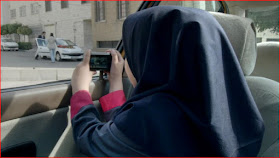It may be that Taxi gets more attention than it deserves aesthetically because of the circumstances under which it was made. Panahi has some freedom of movement within Iran and used it to drive a taxi cab around Teheran in order to shoot his film. He leaves the car occasionally, but the camera stays inside, mounted on the dashboard but maneuverable enough to look inside the car, shifting from driver's side to passenger side. Playing himself as probably Teheran's least-knowledgeable cabbie, Panahi deploys actors through town to pick up for little eccentric episodes that serve as slices of life in Iran. He tries to present a cross-section of Iranian society, from a dwarfish video store clerk who tries to sell bootleg DVDs to the director, a past customer whom he, a film buff himself, recognizes instantly, to a couple of batty old ladies whose lives seem to depend superstitiously on getting their pet fish into the Pool of Ali. The Iranian authorities probably resented the emphasis on the seamier side of life, particularly the burgeoning black market in media the government censors. Censorship itself becomes the film's subject when Panahi picks up his precocious niece -- obnoxiously precocious as precocious kids everywhere often become -- who's trying to shoot her own movie for a junior film school class. She recites the rules for making a releasable film in Iran, including the avoidance of controversial subjects and such chickenshit as not allowing your hero to wear a necktie. Panahi manages to make comedy out of this potentially (and somewhat actually) heavyhanded material by having the niece argue with a street kid she filmed picking up money that fell out of a bridegroom's pocket during a photo shoot. She browbeats the boy into returning the money so he can appear morally upstanding and her film will be releasable, but everyone ignores him as she kvetches like the global stereotype of the exasperated filmmaker.
Since Panahi seems forced into making himself the subject of his films, there's a certain self-referentiality to Taxi that may be meant to hide the film's more obvious debt to someone else's picture, Abbas Kiarostami taxi-bound Ten. The passengers who recognize the director, and assume almost unanimously that he must be shooting a movie, comment on how certain incidents resemble scenes from previous Panahi pictures. Inevitably also, Panahi's own sense of persecution asserts itself at the end when, after a scene with a human-rights lawyer who faces a ban of her own, he and the niece go to Ali's Pool to return a pocketbook one of the old ladies left in the car. As uncle and niece leave the car and disappear, the government spies some viewers probably expected to see all along finally show up to break into the cab and grab the camera. It can be argued that Panahi overstates his case here, since the world has seen and honored Taxi and, to my knowledge, he still isn't in jail. But given his circumstances a certain angry overstatement is understandable, just as all the film's limitations can be excused in light of the risky ingenuity that's gotten his most recent films made and released. Whatever Taxi's shortcomings -- derivativeness, narcissism, heavyhandedness -- like all the best Iranian films it's still a breath of fresh air for us foreigners, a window into an Iran that's not defined by its own or its enemies' propaganda. The taxi-ride format automatically appeals to the virtual tourist in me, and despite any limitations you perceive you can tell that it's the work of a brilliant, resilient filmmaker whose filmography has more historic value already than those of most living directors. Taxi is certainly open to criticism, but it deserves celebration as well.





No comments:
Post a Comment